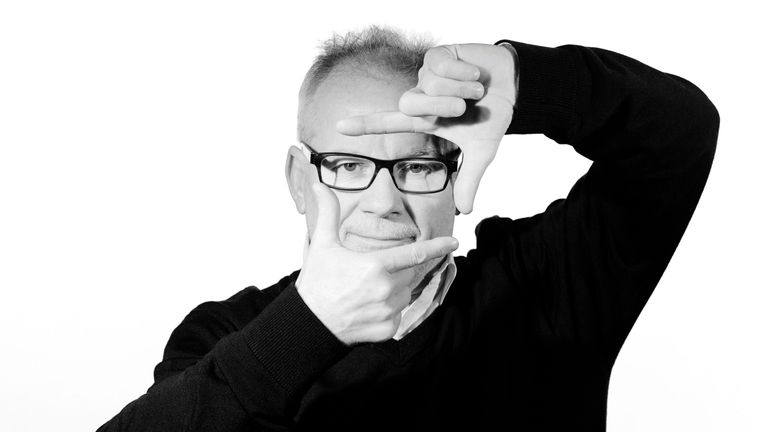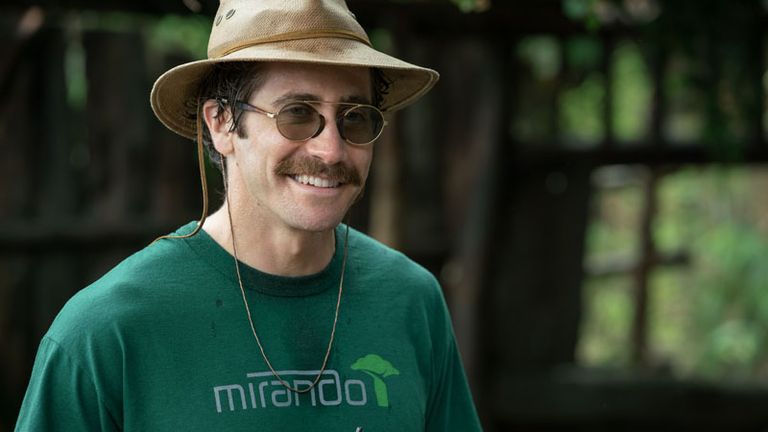Netflix at Cannes: One step forward, two steps back
Cannes' new rule to limit Netflix entries for its main prize shows it is a festival hostage to industry lobbyists.
Thursday 11 May 2017 16:42, UK
The Cannes Film Festival has reversed a recent decision to allow streaming-only movies to compete for the Palme d'Or.
The war fought on the glitzy shores of the French Riviera has been rekindled after what appeared to be a historic truce.
Last month, for the first time ever, the high-brow organisers of the biggest film festival in Europe announced two Netflix movies were in the running for the coveted Palme d'Or.
Come next week, Noah Baumbach's The Meyerowitz Stories and Bong Joon-Ho's Okja will be competing side by side with traditional theatrically released films.
This was a major step forward by Thierry Fremaux, the festival director, who for years defended Cannes' traditionalism, objecting against Netflix's streaming-first film strategy.
"The Cannes festival is a lab," he proudly said, announcing this year's edition would also include for the first time television series and virtual reality.
It felt like the festival was finally keeping up with a rapidly changing industry, where players like Netflix, Amazon or Hulu have an important role to play - and big money to spend.
But change any environment and threatened species will fight for their survival.
One day after the line-up was announced, the French Theatrical Exhibitors Guild (FNCF) issued an angry protest.
"While France's exhibitors are neither questioning the independence of the programming of the world's biggest film festival, nor the emerging of new international players such as Amazon which are contributing to the development and financing of films, we are contesting the festival's choice which was made without consulting us," the FNCF said.
This could almost pass off as a legitimate request, for an important institution to be consulted on any decision, but this is France, the country with the strictest film regulations in the European market.
In France, SVOD (Streaming or Subscription Video on Demand) services have to wait three years after a film's theatrical release to be able to buy its rights.
This protects neither the consumer, nor the producers, nor the festival.
These are regulations meant to protect the FNCF, and the FNCF alone.
::
Fremaux heard the plea of the traditionalists, and promised to discuss with Netflix and other streaming services the possibility to reach an agreement, and release the films both online and in French cinemas.
On Wednesday, he said his efforts were "in vain", and it's not hard to understand why.
Netflix's whole business model is built on its original programming and the fact that users will have access to it as soon as they're released.
For film fans, this works because for a subscription price you have access to more movies.
For producers it works because Netflix invests more money than any of the traditional studios.
In European productions the streaming giant has put in nearly $2bn last year alone.
::
What Fremaux and the Cannes posy were trying to broker was an agreement to destroy these companies' business model and defend traditional lobbies.
"The festival is pleased to welcome a new operator which has decided to invest in cinema but wants to reiterate its support to the traditional mode of exhibition of cinema in France and in the world," the statement reads.
"Consequently, and after consulting its members of the board, the Festival de Cannes has decided to adapt its rules to this unseen situation until now: any film that wishes to compete in competition at Cannes will have to commit itself to being distributed in French movie theatres."
The Meyerowitz Stories and Okja will remain the running this year, but going forward only theatrically released films will be able to compete.
The response from Netflix's chief Reed Hastings was as revolutionary as expected from a company vowing to change the game.
"The establishment closing ranks against us," Hastings wrote on Facebook.
He then added a promotion for a Netflix title.
"See Okja on Netflix June 28th. Amazing film that theatre chains want to block us from entering into Cannes film festival competition."
This is a truly dissatisfying outcome, because by closing its doors to the future, Fremaux is endangering the survival of Cannes in the long run.
It's also dissatisfying because it shows Netflix's guerrilla approach isn't working, and this could harm the streaming giant's position in the industry.
But, most of all, it's bad for European producers, who will have to choose between having the money to create great movies or having a festival to promote them.
The Cannes International Film Festival runs from 17 to 28 May.







